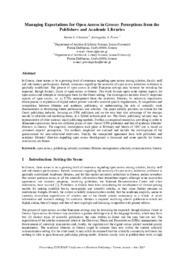Managing Expectations for Open Access in Greece: perceptions from the Publishers and Academic Libraries

View/Open
Date
2007Author
Κωσταγιόλας, Πέτρος
Μπάνου, Χριστίνα
Kostagiolas, Petros
Banou, Christina
Metadata
Show full item recordAbstract
In Greece, there seems to be a growing level of awareness regarding open access among scholars, faculty staff and information professionals. Indeed, consensus regarding the necessity of open access initiatives in Greece is gradually established. The present of open access in other European settings may however be revealing the expected, though distinct, future of open access in Greece. This work focuses upon some current aspects for open access and attempts to investigate them for the Greek setting. The investigation includes five (5) important aspects of open access, i.e. a) ETDs management from the academic libraries, b) university repositories development, c) regulation of digital and/or printed scientific material quality requirements, d) cooperation and competition between libraries and academic publishers, e) understanding the role of scientific work dissemination in developing future professionals and scholars. The paper initially provides an outline for the Greek publishing industry, focusing on STM publishers and on the way they take advantage of the changes mainly in editorial and marketing terms, in a hybrid technological era. The Greek publishing industry may be representative of other national small publishing markets. Further, an empirical research is providing in order to illuminate open access from two different points of view: that of STM publishers and that of academic libraries' directors in Greece. The empirical investigation took place in February and March of 2007 and is based on seventeen experts' perceptions. The methods employed are outlined and include the development of the questionnaire for semi-structured interviews. Finally, the unexpected agreement from both publishers and academic libraries' directors regarding open access development is discussed and some specific for Greece conclusions are drawn.